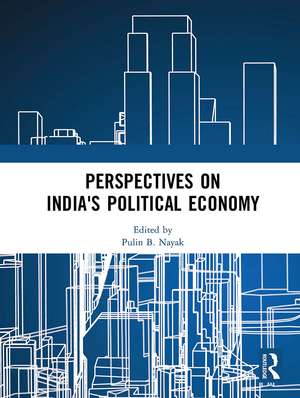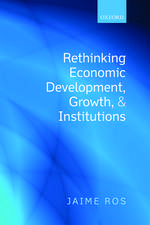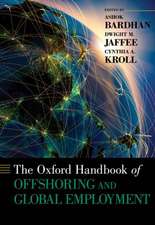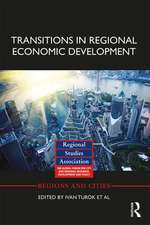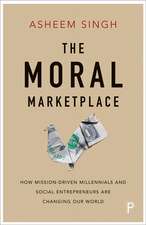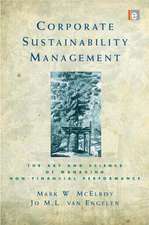Perspectives on India's Political Economy
Editat de Pulin B. Nayaken Limba Engleză Paperback – 25 sep 2023
The present volume is a purposive selection of 23 articles out of the 75 pieces published earlier in four volumes with the title Economic Development of India, by Routledge in 2015. This selection is brought out with the aim of retaining the flavour of the theme under discussion in a succinct single cover volume with a new introduction that ruminates on the recent developments.
| Toate formatele și edițiile | Preț | Express |
|---|---|---|
| Paperback (1) | 264.39 lei 6-8 săpt. | |
| Taylor & Francis – 25 sep 2023 | 264.39 lei 6-8 săpt. | |
| Hardback (1) | 771.13 lei 6-8 săpt. | |
| Taylor & Francis – 23 mar 2018 | 771.13 lei 6-8 săpt. |
Preț: 264.39 lei
Preț vechi: 336.34 lei
-21% Nou
Puncte Express: 397
Preț estimativ în valută:
50.60€ • 52.63$ • 41.77£
50.60€ • 52.63$ • 41.77£
Carte tipărită la comandă
Livrare economică 14-28 aprilie
Preluare comenzi: 021 569.72.76
Specificații
ISBN-13: 9781032652979
ISBN-10: 1032652977
Pagini: 364
Ilustrații: 10
Dimensiuni: 189 x 246 mm
Greutate: 0.67 kg
Ediția:1
Editura: Taylor & Francis
Colecția Routledge
Locul publicării:Oxford, United Kingdom
ISBN-10: 1032652977
Pagini: 364
Ilustrații: 10
Dimensiuni: 189 x 246 mm
Greutate: 0.67 kg
Ediția:1
Editura: Taylor & Francis
Colecția Routledge
Locul publicării:Oxford, United Kingdom
Public țintă
PostgraduateCuprins
Acknowledgements, Introduction: the political economy of India’s development, Part 1 Thinking about development, 1. The bean in our eyes, 2. India in comparative perspective, 3. Unto this last: Sarvodaya—non-violent social transformation, 4. The National Planning Committee and the Congress and industry: big industry versus cottage industry, 5. India in the modern world, 6. Socialist strategy of development, 7. Self-reliance and the perspective for development, 8. Evidence before the Southborough Committee: 27 January 1919, 9. Development economics and the Indian experience, 10. The debate on Gandhian ideas, 11. Nationalist planning for autarky and state hegemony: development strategy under Nehru, Part II Understanding India’s development, 12. Market failure and government failure, 13. The state and the market, 14. Development economics as a paradigm, 15. Natura facit saltum: analysis of the disequilibrium growth process, 16. Economic reforms and poverty alleviation, 17. Predatory growth, 18. Some implications of contemporary globalisation, 19. A framework of planning for India, 20. Investment, income and the multiplier in an underdeveloped economy, 21. Labor union resistance to economic liberalization in India: what can national and state level patterns of protests against privatization tell us?, 22. Labour and economic reforms: disjointed critiques, 23. Politics of exclusion
Notă biografică
Pulin B. Nayak is presently at the Centre for Development Economics, Delhi School of Economics. He was formerly Professor of Economics and Director of the Delhi School of Economics. He has written on issues pertaining to public finance and economic development.
Descriere
This volume contains some of the core foundational contributions on the broad theme of the political economy of India’s development. The extant collections of readings on development economics usually contain readings from academic economists like Sen, Bhagwati, Bardhan, Dreze, Basu, etc. The purpose of this collection is to point out to the lay reader that there is a world of writing on development that is outside the realms of academia. Accordingly, we look at the contributions of figures like Mahatma Gandhi, Jawaharlal Nehru, Babasaheb Ambedkar, Ram Manohar Lohia, etc., who too had thought hard and deep about the process of India’s development.
